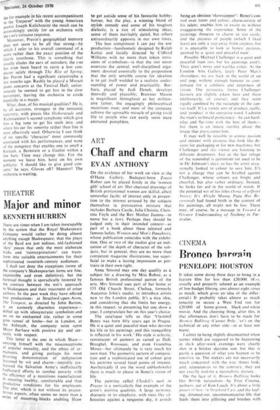CINEMA
Bronco bnrcya;Ti
PENELOPE HOUSTON
It takes some doing these days to bring in a feature film for less than £20,000. (K es, usually and properly saluted as an example of low-budget filming, cost almost eight times as much, which gives an idea of the differ- ential.) It probably takes almost as much tenacity to secure a West End run for £20,000 of home-grown, black-and-white movie. And the cheering thing, after this, is that allowances don't have to be made for Bronco Bullfrog (Cameo Poly, 'AA') on the technical or any other side—or at least not many.
I admit to being slightly disconcerted when scenes which are supposed to be happening in slack after-work evenings were clearly shot in a brisker daytime sun: but that is partly a question of what you happen to he sensitive to. The makers age not necessarily much concerned with the way things look; and, appearances to the contrary, they are not exactly making a naturalistic picture.
On the face of it. Bronco Bullfrog looks like British naturalism—by Free Cinema, perhans. out of Ken Loach. It's about a little grotto of hos, ;11 Stratford Fast, and the loaf- ing. dimmed-out, uncommunicative life that leads them into pilfering and brushes with the law. All the actors are non-professionals; much of the dialogue was improvised, with- in given situations. And since there's hardly a character (or amateur actor) who doesn't display a fine inarticulateness in front of the camera, much of the talk consists of flat little sentences cracking circumspect silences. Two
girls are manoeuvred into joining the boys at a. café table. There's a mumble of introduc- tions, everyone stares at the sauce bottles. `We'd better be going now,' one girl says, brightly desperate, after some thirty per- plexed seconds.
The achievement of the twenty-five-year- old director, Barney Platts-Mills, is to make the film's sympathetic style work through its gaucheness. At the beginning, you feel no group of people could speak with such con- sistent flatness. After a while, this almost Bressonian impassivity not only sounds like one way to get amateurs talking, but be- comes part of the monochrome of back- ground which is one of the film's themes, and of the understatement that is its method.
Anti-climax and a dejected comedy haunt the characters' efforts. When they smash into a cheap café, they get away with only a few bob and a cardboard box of buns. (`Cakes?'
says the ex-Borstal boy to whom they boast of this triumph, 'You took cakes?') Seven-
teen-year-old Del (Del Walker, long-faced
but with a junior version of that pursed, mis- trusting Tom Courtenay stare) runs off with
his fifteen-year-old girl friend to a country uncle. Having got that far, he's scared to suggest they've come to stay; and they wander back, with a collapsing carrier bag of possessions, to dump themselves on their Mercutio, the Borstal boy. He is living in a litter of unopened electric blankets and electric mixers, houseproud amid his ab- surdly uncashable stolen assets.
Bronco Bullfrog never patronises its char- acters, because it achieves such a special relationship with their viewpoints. Does it sentimentalise in seeing them as babes in the concrete woods of Stratford East, stealing like children to attract attention? Perhaps; but the really forlorn thing is the persuasion that this is probably the way they would helplessly see themselves. The film is also very English and puritanical, not only in the reticence of its relationships but in a particu- lar suggestion of cockney outrage. When the boys do get in on a real railway goods yard robbery, they are taken aback at the rough company it lets them in for. The stiffening of gang confidence is entirely lacking. Symp- tomatically, the film they try to see in the West End is not Easy Rider but Oliver!: these are the children who wouldn't know how to ask for more.
Certainly this grave, funny, honestly London-born film is a major achievement for Platts-Mills and his young producer, Andrew St John. Taken as a social document, it leaves a tricky open question, having to do with the equivocal relationship between in- articulateness before the camera and in- sufficiency before life.
Putney Swope (Paris Pullman, and Times, Baker Street, 'x') which seems to be having one of those unaccountable cult successes in the United States, is a berserk and jaundiced free-for-all, sluttishly directed by Robert Downey, about an advertising agency which falls into the hands of black power. Lurch- ing all over the place, like a very old car in constant danger of blowing a gasket, it fills in an incoherent babble of black and white jibes at corrupting, boobyish Madison Avenue with puny political fantasies, like the American president as an ageing midget master-minded by an hysterical German. Altogether, yet another demonstration that it isn't enough to be merely offensive : it helps to be funny as well,















































 Previous page
Previous page